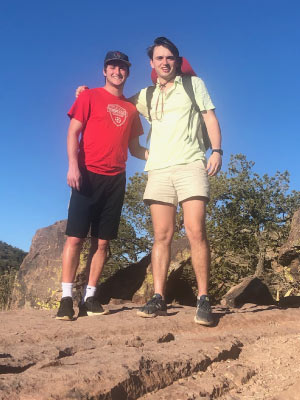Beginning college without knowing what to major in is a challenge many students face, including undergraduate Nelson Institute student, Isaac Eskind.
“Going into my junior year, I needed to make a decision on my major,” said Eskind. “I wasn’t sure if I wanted to go into economics or finance, but I knew I wanted to do environmental studies because the classes were thought-provoking and had engaging professors.”
Originally from Nashville, Tenn., Eskind came to the University of Wisconsin-Madison in search of a major he was passionate about. After taking some classes and getting involved with events like Nelson Institute’s Weston Roundtable series, Eskind landed on a double major in Finance and Environmental Studies.
Through the Weston Roundtable series, Eskind became introduced to Greg Nemet, Nelson Institute affiliate and Professor of Public Affairs. Nemet specializes in policy analysis, energy systems, and international environmental policy, subjects that Eskind was interested in learning more about. After reaching out to Nemet, Eskind began working on diffusion of climate policy and researching a policy mechanism intended to accelerate investments in renewable energy known as feed-in tariffs.
“[Nemet] started out by assigning papers and annual reports to read, just to get a background in what we were doing,” said Eskind. “Then, Nemet and I designed an independent study for two semesters. First a study on feed-in tariffs then expanding the research by adding more types of policy. It was a great experience and I really enjoyed working with him.”
Nemet shared a similar feeling to working with Eskind. “I was impressed by his commitment to learning more about climate policy and how public policy can enable some of the potential solutions,” said Nemet. “He worked on building a novel dataset of when and where three types of climate policies were adopted: feed-in tariffs for renewable energy, carbon prices, and net-zero targets. He then analyzed them and found that policy adoption follows an S-curve shape familiar to those studying technology adoption. I look forward to seeing what Isaac does next.”
Eskind explored ways to get involved outside of his classes and joined a student subcommittee for sustainability that focused on the different things the university could do to improve its sustainability.
“I pushed for sustainable athletics,” said Eskind. “I thought zero trash at games, carbon-neutral athletics, or all stadiums are powered by renewable energy would all be impactful goals. I imagined that it would create a good image for our university and would catalyze other schools like us to follow suit.”

Eskind also joined the University of Wisconsin Divestment Coalition, a state-wide organization that involves students from all UW System schools. “It’s basically a large campaign to try and get the UW System divested from fossil fuels,” said Eskind. “It has been a privilege to work alongside a lot of dedicated people.”
During the summer of 2020, Eskind worked for an Environmental, Social, and Governance (ESG) research firm called Boundless Impact Investing where he researched, wrote, and developed reports for investors on nuanced ESG investing areas such as LED lighting, desalination and more, with an emphasis on future private investment possibilities. Eskind also created environmental key performance indicators for 37 different impact investing areas, such as carbon-to-value, and water management technology during his time at Boundless Impact Investing.
This past summer, Eskind joined Next Rung Technology, a consulting firm in Boston, Mass. that focuses on guiding private companies as they commercialize emerging sustainable technologies, for an internship position.
“I work in the alternative food space to figure out how our clients can scale up their production in the most cost-effective way. This includes modeling the impacts of technical and business decisions.” said Eskind. “I’m also doing research on fields that we may tap into. For example, I am gathering data and other information on the carbon to value space and the green hydrogen space. My hope is that getting an understanding of companies in this space could lead to successful partnerships down the road.”
Eskind plans to graduate in December of 2021 and has an interest in working in the startup world for a company hoping to tackle climate change issues, or for an impact investing company, investing with an ESG purpose. “I believe in the power of business, I believe that it can create a lot of the change we seek,” said Eskind.
“I am very thankful that I’m an environmental studies major,” said Eskind. “I felt that they really cared about me as a student. I also liked the professors whom I have gotten to know, Jonathan Patz, Greg Nemet, and Tracey Holloway to name a few. Their insightfulness and passion are inspiring. The Nelson Institute does a great job of educating their students.”